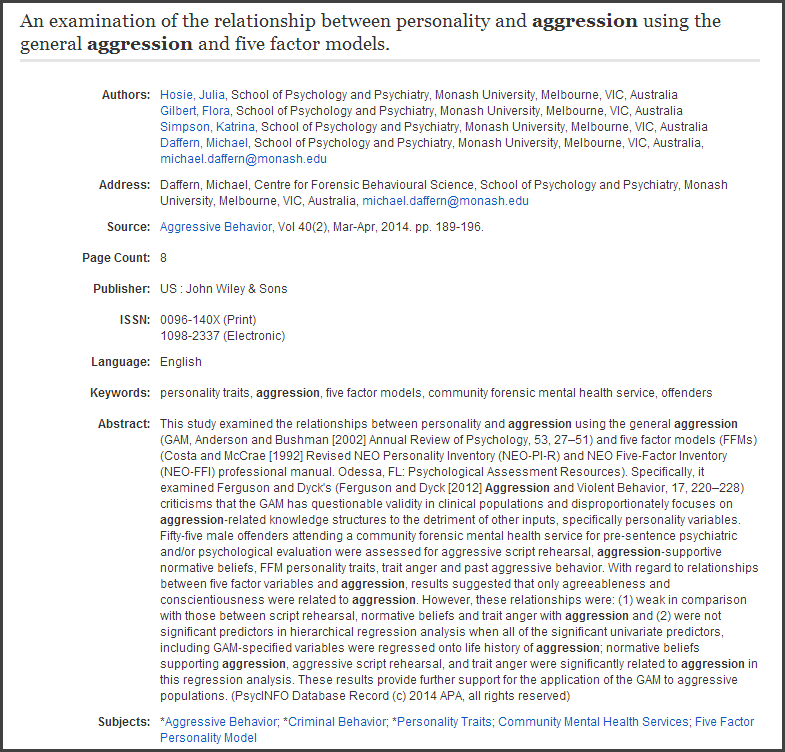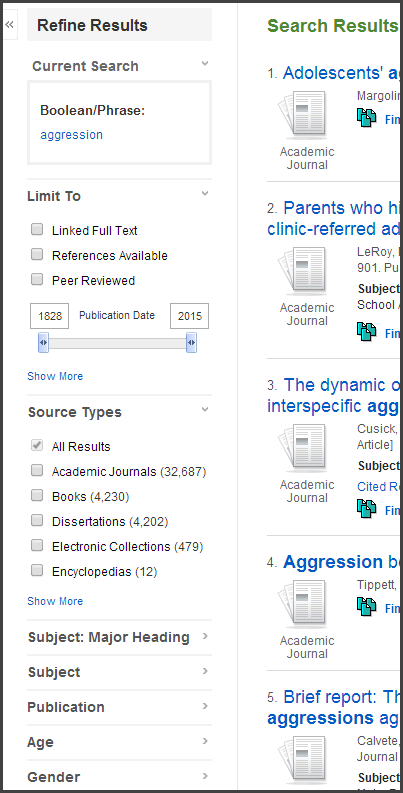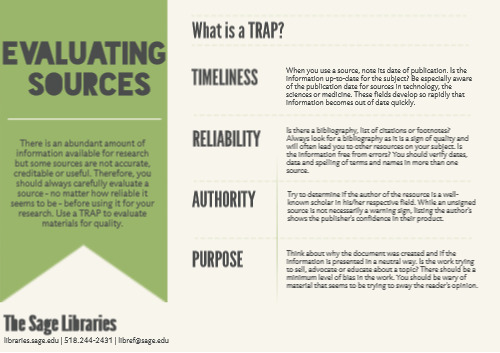Librarian

Jennifer Anderson
Office: Troy Library
Email: [email protected]
Phone: (518) 244-2435
Ask A Librarian
|
|
In person: |
|
By phone: (518) 244-2431 |
|
|
|
By email: |
|
|
By online chat: |
|
|
Schedule an appointment with a Research Librarian |
Keyword Search Tips
Consider adding one of these terms to your search terms: smooth shading, cross-hatching, internal lines, linear style.- Break down your topic into smaller concepts and identify synonyms for those concepts.
- Use "AND" to combine terms in your search, i.e. "wax casting and stone carving"
- Use "OR" to expand your results, i.e. "modelling in clay or wood carving"
- Use QUOTATION MARKS to delineate a group of words as a phrase, i.e. "lyrical abstraction"
- For more search tips, see one of these tutorials:
Find Background Information
Almanacs, dictionaries and encyclopedias are often a good starting point in the research process as they provide background information on a topic. They can also be used to identify key people, events and dates that can be used to find additional information on a topic. Try one of these online reference sources when searching for background information:
Credo Reference
An online reference library containing dictionaries, encyclopedias, thesauri, books of quotations and atlases. Credo Reference also offers a range of subject-specific reference books.
Gale Virtual Reference Library
Reference books in a database format. The sources include multi-volume encyclopedias in history, social sciences and more.
Find Journal Articles
Many of these databases, provide full text coverage. You will often see links that you can click on to connect directly to an article. Look for "PDF Full Text," "HTML Full Text" or "Linked Full Text" somewhere on the page. Examples are below:


 The Find Full Text symbol indicates that Sage may own the material, but it is housed in a different database or journal. Clicking this link will bring you to the article in full text, if owned by Sage.
The Find Full Text symbol indicates that Sage may own the material, but it is housed in a different database or journal. Clicking this link will bring you to the article in full text, if owned by Sage.If full text access is NOT available through the Sage databases, you may request the journal article via Interlibrary Loan (ILL).
PsycINFO: How to Find Subject Headings
When you begin searching in PsycInfo, first type in any keywords that you think are appropriate for your search. You will see a "results" list. The most recent articles appear first, older articles appear on subsequent screens.
The first records that you see are brief records. If you click on the title of any of the brief records you will see a longer record that describes the article more fully. You will note subject headings and an abstract for the article you selected.

It's a good idea to examine the subject headings closely. By looking at the "Subjects" listed after the abstract in the longer record, you will begin to get an idea of which headings fit your topic. By using these subject headings as you continue to search, you will increase the precision of your search. You may also refer to the "keywords" shown just above the abstact to get additional ideas for words to add to your search.
It's also a good idea to click on the titles of several articles so that you can examine subject headings in multiple records. There may be several subject headings that describe your topic differently as you move from article to article.
Here's an example: I typed in "aggression" as a subject heading. I clicked on the title of a few records and examined the subject headings in each article. Some of the subject headings and keywords that I saw mentioned "aggressive behavior", "criminal behavior" and "personality traits" as other possible words that could help with this search.
PSYCInfo: How to Refine Your Search.
After you have figured out the best subject headings or keywords to use, you can start to refine your search with tools provided by PsycInfo.First, type in your subject words or key words, hit "search," and then wait for a set of results to appear. You have to create a set of results before you can "refine" or "limit" them.
Now, look at the left column of the PsycInfo search screen...you will see a column labelled, "Refine Results." Under that you will see "Limit To" and several options under it.

Limit by Publication Date: This option allows you to limit the articles that you retrieve to certain years. Use the slider tool that you see near "Publication Dates" to change the date, or type the dates that you want into the boxes provided.
Age: Further down in the left column, you will see "Age." Click on that and use the choices provided to limit your search to a certain sub-section of the population.
Source types: You can limit your search by "academic journals", "books", etc.
Find Books
Start with WorldCat to find books and media.
RESEARCH TIP: Use a thesaurus to find synonyms to expand your keyword searches.
To find the book on the shelf, you will need to know the library (Albany or Troy), shelving location (Main, New Books, etc.) and call number. This information can be found on the item record (see example below). If you find a book in the catalog but it is on the opposite campus, storage or otherwise inaccesible, use the "Place Hold" function to request the book.

eBooks
All eBooks owned by Sage can be found by searching the Libraries' catalog. You may also search these collections separately.Ebook Collection
A collection of over 10,000 eBooks covering a wide range of disciplines.
Ebook Central
A collection of over 70,000 eBooks covering a broad range of subjects.
eBooks may be downloaded to an eReader device. See here for downloading instructions.
Not finding what you need?
Try searching WorldCat, a catalog of books, media and journals in libraries around the world. You can use Sage's Interlibrary Loan service (ILL) to borrow books from other libraries.Evaluating Sources
There are numerous websites and blogs available on the internet but some may not be accurate, creditable or useful. Therefore, you should always carefully evaluate a source - no matter how reliable it seems to be - before using it for your research. Use a TRAP to evaluate materials for quality.
Citing Sources
General Online Guides
Purdue Online Writing LabCopies of the major style manuals can be found at the Information Desk in either Library.
Citation Management Software
Citation management software is designed to help you store, organize, and cite your research. Most of the available citation management tools will help you store and organize your sources in one place, share sources with other researchers, read and annotate PDFs, insert formatted citations and bibliographies into word processing software.RefWorks
All Sage students, faculty, and staff have access to RefWorks citation manager, free of charge through the Sage Library. Click here to set up a free account with your sage.edu email address. For more help with Refworks, click here.
Quick links to other popular citation managers:
- Mendeley (free)
- Zotero (free)
- EndNote
- EndNote Basic (free version)
Getting Started
- Search for peer-reviewed ARTICLES in PsycINFO or PsycARTICLES. Note that all PsycARTICLES articles are included in PsycINFO. See "PsycINFO vs PsycARTICLES" below for an explanation of the difference between the two databases.
- To search for BOOKS and DVDS owned by Sage, use the Libraries Catalog. Also, consider using our online database of PsycBooks , a database of book chapters from books published by APA and other distinguished publishers.
- Consider searching for ARTICLES in other related subject databases; for examplel Medline or Sociological Abstracts. See list of All Items by Source below.
- Try searching in a broad general database that covers many subject areas: ProQuest Central.
- To gain a better understanding of RESEARCH METHODS, see SAGE Research Methods Video Collection. which contains more than 125 hours of video, including tutorials, case study videos, expert interviews, and more -- covering the entire research methods and statistics curriculum.
Article Databases Specific to Discipline
Article Databases in Related Disciplines
Article Databases Multidisciplinary
AudioVisual
Article Databases in Related Disciplines
Article Databases Multidisciplinary
AudioVisual
Credo Reference
An online reference library containing dictionaries, encyclopedias, thesauri, books of quotations and atlases. Credo Reference also offers a range of subject-specific reference books.
An online reference library containing dictionaries, encyclopedias, thesauri, books of quotations and atlases. Credo Reference also offers a range of subject-specific reference books.
Article Databases Specific to Discipline
PsycARTICLES
A source of full-text scholarly and scientific articles in psychology published by APA and allied organizations.
A source of full-text scholarly and scientific articles in psychology published by APA and allied organizations.
Psychiatry Online
An online collection of key resources for mental health professionals. Includes DSM-V.
An online collection of key resources for mental health professionals. Includes DSM-V.
PsycINFO
Citations and summaries of scholarly journal articles, book chapters and books in psychology and related disciplines.
Citations and summaries of scholarly journal articles, book chapters and books in psychology and related disciplines.
Article Databases in Related Disciplines
Medline
Produced by the National Library of Medicine, MEDLINE provides authoritative medical information on medicine, nursing, the health care system, pre-clinical sciences and more.
Produced by the National Library of Medicine, MEDLINE provides authoritative medical information on medicine, nursing, the health care system, pre-clinical sciences and more.
Mental Measurements Yearbook with Tests in Print
Information and reviews of English language standardized testing covering educational skills, personality, vocational aptitude, as well as psychology and related areas.
Information and reviews of English language standardized testing covering educational skills, personality, vocational aptitude, as well as psychology and related areas.
Science Direct
A collection of scholarly journals covering science, technology, medicine, social sciences and humanities.
A collection of scholarly journals covering science, technology, medicine, social sciences and humanities.
Sociological Abstracts
Abstracts and indexes the international literature in sociology and related disciplines in the social and behavioral sciences.
Abstracts and indexes the international literature in sociology and related disciplines in the social and behavioral sciences.
Article Databases Multidisciplinary
Academic Onefile
A multi-disciplinary database containing thousands of journals and reference sources
A multi-disciplinary database containing thousands of journals and reference sources
Academic Search Elite
Provides full text for more than 2,100 journals, including more than 1,700 peer-reviewed titles. It covers a wide variety of topics including computer sciences, engineering, physics, chemistry, language and linguistics, arts & literature, history, and ethnic studies.
Provides full text for more than 2,100 journals, including more than 1,700 peer-reviewed titles. It covers a wide variety of topics including computer sciences, engineering, physics, chemistry, language and linguistics, arts & literature, history, and ethnic studies.
Google Scholar
Not to be confused with regular (and unreliable) Google. Google Scholar is a freely accessible web search engine that indexes the full text or metadata of scholarly literature across an array of publishing formats and disciplines.
Not to be confused with regular (and unreliable) Google. Google Scholar is a freely accessible web search engine that indexes the full text or metadata of scholarly literature across an array of publishing formats and disciplines.
- Make use of the powerful "Cited By" feature.
- For Interlibrary Loan, click on >> icons.
QuickSearch
Quick Search will search all journal article databases at once. To make use of interlibrary loan, enter your search; on the results page, click "Add results beyond your library's collection."

Quick Search will search all journal article databases at once. To make use of interlibrary loan, enter your search; on the results page, click "Add results beyond your library's collection."
Sage Premier Journal Collection
This journal collection from Sage Publications includes more than 950 scholarly, peer-reviewed journals in disciplines ranging from Business, Humanities, and Social Sciences to Science, Technology and Medicine.
This journal collection from Sage Publications includes more than 950 scholarly, peer-reviewed journals in disciplines ranging from Business, Humanities, and Social Sciences to Science, Technology and Medicine.
PsycBooks
A database of book chapters from books published by APA and other distinguished publishers.
A database of book chapters from books published by APA and other distinguished publishers.
DSM-5
The Diagnostic and Statistical Manual of Mental Disorders, Fifth Edition (DSM-5) is the 2013 update to the Diagnostic and Statistical Manual of Mental Disorders, the taxonomic and diagnostic tool published by the American Psychiatric Association (APA). In the United States, the DSM serves as the principal authority for psychiatric diagnoses.
The Diagnostic and Statistical Manual of Mental Disorders, Fifth Edition (DSM-5) is the 2013 update to the Diagnostic and Statistical Manual of Mental Disorders, the taxonomic and diagnostic tool published by the American Psychiatric Association (APA). In the United States, the DSM serves as the principal authority for psychiatric diagnoses.
DSM-5 Clinical Cases
DSM-5® Clinical Cases is a versatile volume designed to be used in a variety of contexts and for an audience that includes teachers, students, and clinicians.
DSM-5® Clinical Cases is a versatile volume designed to be used in a variety of contexts and for an audience that includes teachers, students, and clinicians.
DSM-5 Handbook of Differential Diagnosis
The DSM-5® Handbook of Differential Diagnosis is the preeminent guide to differential diagnosis for both clinicians and students learning psychiatric diagnosis.
The DSM-5® Handbook of Differential Diagnosis is the preeminent guide to differential diagnosis for both clinicians and students learning psychiatric diagnosis.
Education in Video
A collection of streaming video developed specifically for training and developing teachers.
A collection of streaming video developed specifically for training and developing teachers.
Psychotherapy.net
Psychotherapy.net is streaming video collection featuring demonstrations of psychotherapy and counseling sessions, covering a wide range of modalities, populations and approaches.
Psychotherapy.net videos are split between two platforms: Because Psychotherapy.net videos are split between two platforms, to search a particular title or subject, search the title in the RSC Libraries catalog and include "psychotherapy.net" in the search.
Psychotherapy.net is streaming video collection featuring demonstrations of psychotherapy and counseling sessions, covering a wide range of modalities, populations and approaches.
Psychotherapy.net videos are split between two platforms: Because Psychotherapy.net videos are split between two platforms, to search a particular title or subject, search the title in the RSC Libraries catalog and include "psychotherapy.net" in the search.
Dissertations & Theses: Full Text
Comprehensive collection of dissertations and theses from around the world, spanning from 1861 to the present day and offering full text for most of the dissertations added since 1997.
Comprehensive collection of dissertations and theses from around the world, spanning from 1861 to the present day and offering full text for most of the dissertations added since 1997.
American Psychological Association
APA is the leading scientific and professional organization representing psychology in the United States, with more than 122,000 researchers, educators, clinicians, consultants and students as its members.
APA is the leading scientific and professional organization representing psychology in the United States, with more than 122,000 researchers, educators, clinicians, consultants and students as its members.
American Society of Group Therapy and Psychodrama
First and oldest organization in Psychodrama, Sociometry and Group Psychotherapy in the United States as well as Internationally.
First and oldest organization in Psychodrama, Sociometry and Group Psychotherapy in the United States as well as Internationally.
Return to Subject Guide List
Item List: Databases & Other Sources
Getting Started
Subject Specialist
Ask Us
Keyword Searching
Find Journal Articles
PsychInfo: Find Subject Headings
PsychInfo: Refine your Search
Find Background Information
PsycARTICLES vs PsycINFO
Find Books
Evaluating Sources
Citing Sources
Item List: Databases & Other Sources
Getting Started
Subject Specialist
Ask Us
Keyword Searching
Find Journal Articles
PsychInfo: Find Subject Headings
PsychInfo: Refine your Search
Find Background Information
PsycARTICLES vs PsycINFO
Find Books
Evaluating Sources
Citing Sources
PsycARTICLES vs. PsycINFO: What is the difference?
PsycINFO covers articles from over 2,500 scholarly journal articles, book chapters, books and dissertations. This database provides comprehensive coverage of psychology literature from all over the world and from many publishers. There are over 3 million records in this database.
The library subscribes to many full-text journals in this database, but not all articles covered are available via full-text. Students can use Inter-Library Loan to obtain articles that appear in journals to which we don’t subscribe.
PsycARTICLES covers almost 80 scholarly journal journals published by the American Psychological Association (APA) and ahandful of other publishers affiliated with APA. There are over 150,000 records in this database.
Searching PsycArticles will help you locate excellent content…but be aware that you are missing out on a very large pile of psychology journals, not published by APA, and not included in this database. All of the articles in PsycArticles are also indexed and included in PsycInfo. One advantage to using PsycArticles though is that all of the content is full-text.
Recommendation: Decide how comprehensive your search needs to be. Do you want to cover all of the world’s literature or just APA-published content?

